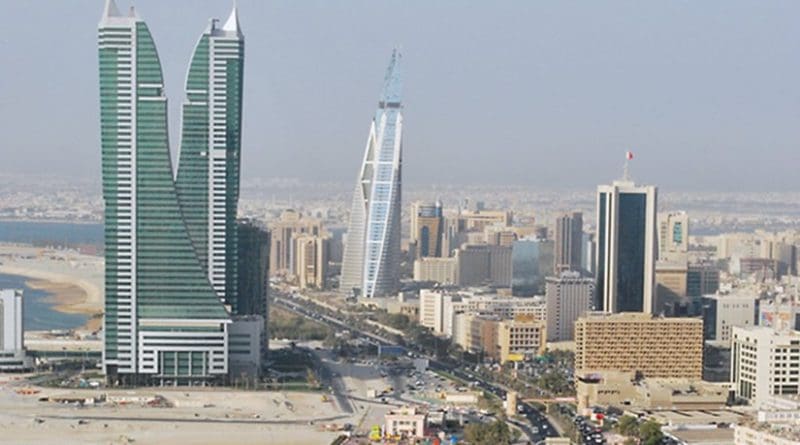A Look At Bahrain’s International And Domestic Investment Strategies – Analysis
By Rory Devine
Although Bahrain was the first Gulf Cooperation Council (G.C.C.) member to become a major financial hub, the Gulf Arab kingdom still depends on oil for 70 percent of government revenue and 20 percent of GDP. Along with Oman, Bahrain’s efforts to plan for a post-petro economy started long before other G.C.C. states. In October 2008, King Hamad bin Isa al-Khalifa launched the Economic Vision 2030, aimed at enhancing Bahrain’s “sustainability, fairness and competitiveness.”
An important indicator of Bahrain’s ability to live up to the King’s vision will be the strategy of the country’s sovereign wealth fund, Mumtalakat. One of the only sovereign wealth funds in the Middle East to publish its financial summaries, Mumtalakat plans to continue its global reach with an anticipated $400 million allocated for international investments in 2016. At the heart of Mumtalakat’s 2016 investment strategy is to diversify its portfolio in line with Economic Vision 2030. This 15-year plan, promulgated by King Hamad, aims to expand Bahrain’s industries and drive private sector growth.
Started in 2006, Bahrain’s $11.2 billion sovereign wealth fund (whose name means “assets” in Arabic) has endured numerous restructuring programs. To reduce operating costs and increase its ability to procure top international talent to the firm, Mumtalakat has cut jobs. In 2009 the firm’s CEO, Mahmood Hashim al-Kooheji, brought in consultants from McKinsey and Co., who produced advantageous results in highlighting and mitigating inefficiencies, as well as fostering greater transparency. Through the help of the advisers, Mumtalakat spotted government corruption and bribery, which amounted to $400 million in lost profits of one of the firm’s top producers, Alba. Last year, the sovereign wealth fund received a ten out of ten in the Linaburg-Maduell Transparency Index, which surveyed 52 funds with only 11 receiving top scores.
Even though Mumtalakat dwarfs in comparison to its counterparts in other G.C.C. states, including the Abu Dhabi Investment Authority and the Qatar Investment Authority, Bahrain’s sovereign wealth fund is starting to broaden its global footprint. Currently, Mumtalakat’s most significant investments are domestic and comprise majority stakes in Alba (67 percent), Edamah (100 percent), Batelco (37 percent), the National Bank of Bahrain (45 percent), and Gulf Air (100 percent). After this year’s shortfall of the region’s economies, Mumtalakat has looked to bolstering its international presence in its focus areas that span the industrial, manufacturing, real estate, tourism, and education sectors.
Bahrain’s sovereign wealth fund experienced a 68.7 percent drop in net profits from its 2014 number of $243.6 million to $76.3 million in 2015. Kooheji attributed these losses, in a press release, to the significant reduction and fluctuation in aluminum prices, following a surfeit of Chinese aluminum exports which severely crippled Alba’s profitability. Nevertheless, Mumtalakat-owned Gulf Air was able to narrow its operation losses to $63.9 million from the previous year’s $174.5 million. For Kooheji, Mumtalakat’s 2014 oversees investments of $335 million produced favorable yields that have led the firm to look towards boosting international investments in 2016.
In March, Mumtalakat obtained a 49 percent stake in the Spanish manufacturer of aluminum grain refiners and master alloys, ALEASTUR. That same month, Mumtalakat signed an agreement with Gulf Gyro, a Kuwait-based producer of industrial gasses with operations in 12 countries. Under this deal, the Bahraini fund gained a 10 percent stake in the region’s resource-giant. Other significant international investments include the 2015 signing of a definitive agreement with InvestCorp to acquire Nobel Learning Communities from Leeds Equity Partners. Prior to this arrangement, Mumtalakat had a significant stake in the education service that manages 176 K-12 schools in the United States.
More recently, Mumtalakat signed a $250 million contract with Regent Properties, headquartered in the U.S., to invest in Class-A office buildings in Dallas and Phoenix, America’s fourth and sixth largest cities, respectively. These cities are home to illustrious Fortune 100 companies and have shown significant growth since 2000. Moreover, these financial centers do not contain the same level of competition between real estate firms, as do New York City, Los Angeles and other key commercial hubs in North America.
As the single biggest promoter of growth in Bahrain and among the most prominent developers in the region, it is important to observe Mumtalakat’s investments moving forward. Yet, the fund’s persistence in providing transparency and accountability for its financial offerings has placed the firm in line with its goals held under Vision 2030.
These reforms come at a contentious period for Bahrain. Five years after the Pearl Roundabout protests in Manama during the 2011 “Arab Spring,” political suppression, economic marginalization, and lack of employment opportunities for the nation’s Shi’ites remains resolute. Regional conflicts in Iraq, Syria, and Yemen, as well as the crackdown on Shi’ite dissent in Saudi Arabia’s Eastern Province are also exacerbating tensions between Bahrain’s Sunni rulers and the country’s Shi’ite majority.
Given the interconnectedness between Bahrain’s political crisis and economic stagnation amid an era of cheap oil, long-term stability in the island kingdom will require resolution of both the sectarian problems and a plan for sustainable economic growth. Mumtalakat’s global strategy offers Bahrain an opportunity to achieve King Hamad’s vision of a prosperous country with a diversified economy.
International Policy Digest originally published this article.
*Rory Devine is a contributor to Gulf State Analytics (@GulfStateAnalyt)

